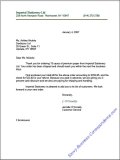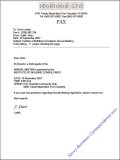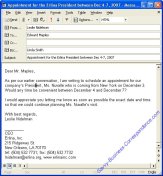Types of Business Correspondence
Identifying Business Correspondence Types should Be Easy, Right?
Dixie loves the topic of business correspondence, there's no doubt about it. But it doesn't prevent her from admitting that a lot of things about it are controversial or confusing. Sometimes Dixie wonders why humans tend to overcomplicate their lives. Even such a simple task as identifying types of business correspondence can be daunting.

Types of Business Correspondence
So, this situation has prompted Dixie to take things into her own hands and create one more classification of business correspondence types. Some of you might argue that piling one more classification upon all the existing ones is not the best way to end the confusion but Dixie does have a serious argument in her defence: the purpose of her classification is focusing on the types of business correspondence you need to know or learn about if you are in business.
Dixie's Classification of the Types of Business Correspondence
There are quite a few types of business correspondence in the contemporary office. Dixie subdivides them into
1. Types of Business Correspondence You Need to Learn Rules for (at least somewhat) and
2. Other Types of Business Correspondence
The thing is, some of the business correspondence types are much more important to know/learn when your work in the office than the others. Even if you know nothing about some types of business correspondence (classified as Other) you can be a very good professional, with very few exceptions. But beware! If you are not familiar with the types of business correspondence that have certain rules and don't know how to write them, your career is in trouble. But don’t get scared easily. They are easy to learn. And using Dixie’s site can help tremendously, even if she says so herself.
So without further ado Dixie invites you to proceed to Class One types of business correspondence which she will call major for the sake of shortening the long name. Scroll down to the Other Types of Business Correspondence if that’s what you’re interested in.
Major Types of Business Correspondence:
Business Letters
Business Memos
Business Faxes and
Business Email
Dixie covers major types of business correspondence extensively on her site, and the good news is you need to know well just four types if you are interested in a business career.
Business Letters
Business letters have been the only type of business correspondence for much longer than any of us can remember, so "business correspondence" is still associated with them more than with its any other type. And as anything that "has been there" for a long time business letters just have to have very well established rules and regulations. And as Dixie says, there are some rules you cannot afford to ignore when writing a business letter. Though a lot of the rules can be adjusted to your needs, you need to be familiar with them before you can start "bending" them.
Check out the following pages on Dixie’s site to become an expert on business letters or to refresh your knowledge on certain rules pertaining to writing and sending them:
|
See Dixie's Samples of Business Letters Clicking on the Images below
 |
 |
 |
 |
 |
Business Memos
There are much fewer rules for writing business memos than business letters, and Dixie loves memos for it. They appeared around 1920s and are much "younger" than business letters. This is probably the reason why they usually sound more human (even cats like this fact, Dixie knows). Every business uses lots of business memos, and a lot of them nowadays are sent by email which makes them even more ubiquitous.
Dixie has two pages on business memos that cover the basics of memo writing very well, a page that provides
|
Go to the Memo Samples on Dixie's Site Clicking on the Images below
 |  |
Business Faxes
Dixie finds it interesting that business faxes have been around even longer than memos, but for a long time very few people had had access to fax machines. So, most of us would say that faxes have been a part of business environment for about 30 years. Consequently, there are not very many rules established for writing faxes. Everybody wrote them the way they considered appropriate.
And now faxes are dying a slow death. There is such a thing as faxing via computer of course, but it is so close to email it should probably be treated like one. However, Dixie does think fax machines are still useful in a lot of cases.
You can find Dixie's arguments about keeping your fax machine and basic facts about faxes on the
|
Dixie Offers to Your Attention a Fax Cover Sheet Sample, Just Click the Image below

Business Email
Dixie considers business email the reigning queen of business correspondence. She listed it last in her classification because it is relatively new compared to other types of business correspondence. But it is probably even more important than business letters nowadays though it does not substitute them, and probably won't for quite some time. How could we have lived and even conducted business without email?!
Email is the blessing and the curse of modern life, modern businesses included. It is very helpful as a means of instant communication but becomes a burden for those who have thousands of unopened messages sitting in their inbox. Spam is also a very big issue though a little less so lately when there are ways to harness it (more or less).
Dixie would say that email is still in its infancy though we all know it is here to stay and it will be used more and more... if nothing better comes up, of course. Though it's hard to imagine, isn't it? We already have instant messaging and cell phones, among those and email what else can there be?!
|
You Can See a Couple of Email Samples after You Click on the Image below

Are Resumes/CVs and Reports Part of Business Correspondence?
Resumes, aka CVs and reports are considered a type of business correspondence by some experts. Dixie warns you, she is not among them. It is true that both resumes and reports are often sent by mail. But so are a lot of different business documents and forms. Reports can be written in the form of a memo. In such cases Dixie would say that a merge of business correspondence with business documents occurs, and such reports can be treated as a piece of business correspondence. But in general, Dixie would leave resumes and reports out and she doesn't plan to cover them on her site.
On the other hand, Dixie loves helping her readers, so for those of you who are interested in resume and report writing she provides the following links:
- A site about resumes and
- A Guide to Report Writing (pdf), another Report Writing link where you need to scroll down to 'Report Writing' in the navigation bar on the left and a sample of a business report from Newcastle Business School (pdf).
Other Types of Business Correspondence
In Dixie's humble opinion, business newspapers and magazines/journals, press releases and to some extent greeting cards are the types of business correspondence which can be ignored by a lot of business people/cats and left to the professionals or designated specialists.
Dixie has also seen business minutes referred to as a type of business correspondence, others state that business minutes should be considered business reports and/or business documents. As she has already warned you on this page, there is a lot of confusion about business correspondence types. Does it mean the subject is not important enough to be agreed upon? Could very well be .
Resources for Writing All Types of Business Correspondence
The links below point you to the pages on Dixie's site that include the reference information which can be useful for writing any and all types of business correspondence, as well as business reports, business documents and even resumes.
|


|
Email this page | Tweet | You should click one of these buttons to share |
